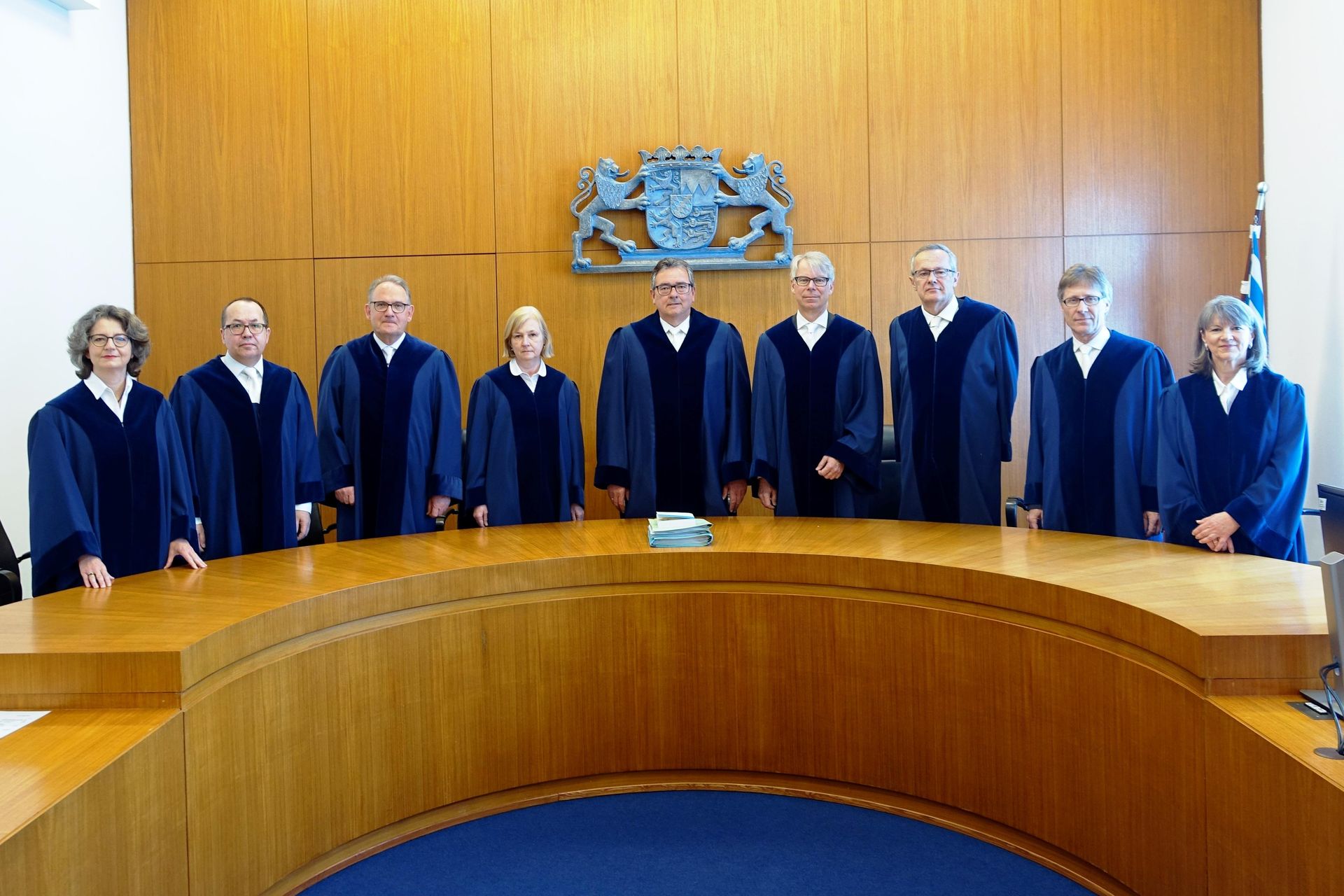Mr. Küspert, the judges in the Constitutional Court are partially determined by the Federal Council, and the other half by the Bundestag. How is a judge at the Bavarian constitutional tribunal elected, and through which process did you become its president?

The Bavarian constitutional tribunal consists, apart from the president, of professional judges and members and their representatives. All members of the constitutional tribunal are elected by the Bavarian state parliament. The president, who always has to be the president of the Higher Regional Court in Munich, Nuremberg, or Bamberg, and the professional judges are elected by the state parliament for a term of high years, which means that when a member’s term is ending, a new successor is elected, or there is a re-election. The members who aren’t judges and their representatives are then elected by the new state parliament after a meeting for the corresponding legislative period according to the principles of proportional representation. This recently occurred on 11 December, 2018.

In the summer of 2017, the Polish State Judicial Council, which appointed the constitutional judges, was dissolved, and now the judges are appointed directly by the Minister of Justice and the parliamentary government majority. Could something like this also theoretically happen in Germany or Bavaria? Are the constitutional organs sufficiently protected by the constitution?

The constitutional tribunal and the core fundaments of its work are not only established through the Bavarian constitutional tribunal, meaning through a simple law, but are also anchored in the Bavarian constitution. A new conception would therefore only be possible if the constitution were changed. This would require a two-thirds majority of the members of state parliament, and the change would have to be presented to a public vote. The Bavarian constitution also expressly protects the principle of a constitutional state and of judiciary independence. Any demands to constitutional changes that go against the democratic principles of the constitution are inadmissible according to Article 75 Section 1 clause 2 of the Bavarian constitution, and can therefore not be touched even in the case of a theoretical constitutional change.
How many judges does the Bavarian constitutional tribunal currently have, and for what areas according to Article 2 of the tribunal are they in charge?
Apart from the president, there are 22 professional judges who are full-time judges at a court in Bavaria, and 15 other members, not counting their representation. The constitutional tribunal makes its decisions, depending on the procedure type, in different groupings in so-called dictum groups. If it’s about the constitutionality of legislation, especially during popular actions, the dictum groups will consist of eight judges apart from the president, but no other members. In other cases, especially when it comes to constitutional complaints, the dictum group consists of the president, three judges, and five other members. A distribution-of-business plan determines ahead of time what dictum groups are responsible for what procedures, and which judges will be a part of it.
How many and what important proceedings are currently taking place at the Bavarian constitutional tribunal?
On average, the constitutional tribunal processes about 110 constitutional complaints and about 20 popular actions per year, since 1947. Annually there are also some other procedures, such as disputes between federal bodies, election contestations, or decisions regarding referendums. Right now we’re dealing with popular actions and differences in opinions to the integration law, to the constitutional protection law, and to the policing law.
A citizen criticises the violation of a fundamental right which is guaranteed in both the constitution and the Bavarian constitution. Are the two constitutions in competition when it comes to questions of constitutional rights?
A complainant in Bavaria can simultaneously submit a constitutional complaint at the federal constitutional court and at the constitutional tribunal. If that happens, then the constitutional court has to examine if there has been a violation of constitutional rights within the constitution, and the constitutional tribunal examines if there’s been a violation of the Bavarian constitution. Many constitutional rights are identically managed in both constitutions and coexist. But the Bavarian constitution goes beyond the constitution in issues such as the right to the enjoyment of nature, Article 141, Section 3, Clause 1.
Article 166 of the Bavarian constitution guarantees the right to work. Can an unemployed person turn to the court? Article 168, Section 1, Clause 2 of the Bavarian Constitution establishes equal pay for equal work for men and women. This doesn’t represent reality, so is it just a theoretical demand and not a real constitutional right?
Article 166 and 168 of the Bavarian constitution don’t guarantee any constitutional rights, but instead consist of so-called program blocks. Therefore a constitutional complaint can’t be based on the violation of these norms. An unemployed citizen cannot come to the constitutional tribunal with a constitutional complaint based on Article 166 of the Bavarian constitution. But program blocks in the constitution aren’t meaningless. The constitutional tribunal can, within the framework of a valid popular action, certainly establish that a Bavarian legal regulation directly contradicts a program block of the Bavarian constitution, which means that the norm is declared invalid. Program blocks can also play a role during the interpretation of other constitutional standards.
Europe doesn’t have a constitution. An attempt failed in 2006 due to the unanimity requirements, since the Netherlands and France didn’t give their approval. Do you think this requirement is fundamentally practical, or should it rather be changed to a qualified majority?
That is a question of political principle which members states and political decision-makers will have to answer. Regardless of whether this would be desirable and legally viable, I currently don’t think it’s realistic to change anything about the unanimity requirement, which only holds for a few political areas, since changing it would require unanimity as well.
Throughout the decades, Brussels has attracted more and more regulatory competences, to the detriment of the legislation of European nations. This is a point often made by populists in Great Britain, Italy, Poland, and Hungary. Do you see an overstitching of competences, or should Brussel start deregulating?
A very fundamental basic element of the European Union is the principle of subsidiarity. Article 5 of the EU Contract explicitly states that the Union will only act in areas that don’t fall under its immediate jurisdiction if and when the goals of the proposed measured cannot be sufficiently realised by member states on a central, regional, or local level. In my opinion, the tendency in the past years has been to strengthen this principle of subsidiarity and to really ask whether Europe needs to do something or whether the member states or the federal states or communes can’t do it, and maybe do it better. But at the same time we’ve also seen during the Euro-crisis that it can be problematic when member states decide to politically act unilaterally in certain areas when the consequences from the mutual currency are carried by all. The correct balance between member states’ sovereignty and the Union’s adequate competencies must be carefully discussed in every political area, and that will continue to be a controversial topic as long as there is a Union.
All necessary and critical discussions aside: we cannot allow that the great achievements of the European Union, namely peace and freedom for almost three quarters of a century, be forgotten.
In the countries named above there is a growing nationalistic presence. The “enemy” that is needed for such campaigns is found in Brussel or in the supposedly superior Germany. Populist parties are also growing here, and they continue to gain followers on social media. Do you see a growing danger to democracy?
Democracy mostly lives off of the fact that the sovereign people are sufficiently informed to make informed electoral decisions. When populists, our of egoistical motives and especially through false or misunderstood statements, consciously stoke the fears of the population and present the political situation as needlessly dramatic and create a supposed “enemy” as a scapegoat, then that’s surely problematic. But I still see Germany’s democracy, despite some singular cases, as not being under serious threat. As long as the majority continues to support democracy, it will survive all threats.
The philosopher Peter Sloterdijk said in 2017 that nothing is better than democracy to get rid of democracy. After the fall of the Soviet empire, democracy was considered the only correct state form, and its victory march across the world was only a question of time. The American political scientist Francis Fukuyama even said in 1992 that it would be the end of history. Do you believe in a further spread of democracy, or do you think it will soon lose its meaning?
If history has shown a few things, then it’s that there’s no such thing as the “end of history” as long as there are humans. But it’s hard to say what the future will bring. I do agree with Sloterdijk’s statement in the sense that democracy has a harder time fighting against its enemies than other forms of government. Globally we continue to see states in which democratic ideals prevail, and states in which democracy is in serious danger. In my opinion, democracy is currently the best form of government — despite its weaknesses that it may have— for a state that’s based on a humanistic and enlightened concept of humanity. I therefore also believe that it will continue to prevail as an idea, with some setbacks.
Do you believe in a causal relationship between a prospering economy and a functioning democracy?
Yes, especially when considering democratic constitutional states. Oftentimes a functioning economy will be able to develop in places where there are secure framework conditions that are guaranteed by a functioning constitutional state. We continue to experience cases in which businesses withdraw from promising markets because they don’t want to invest in constitutionally unstable states. Businesses are even withdrawing from a traditional democracy like Great Britain, because they’re concerned about the uncertainties regarding Brexit. Democracy on the other hand ensures that people can participate in the shaping of political frameworks, within which economic activities can prosper.
INTERVIEW Dr Helmut Schmidt

